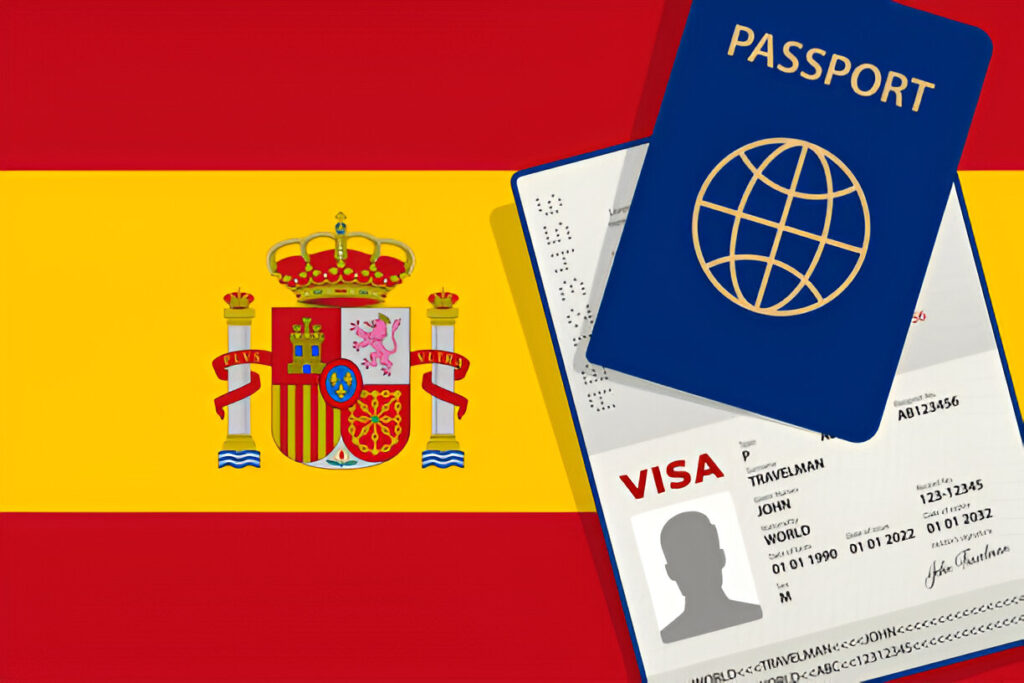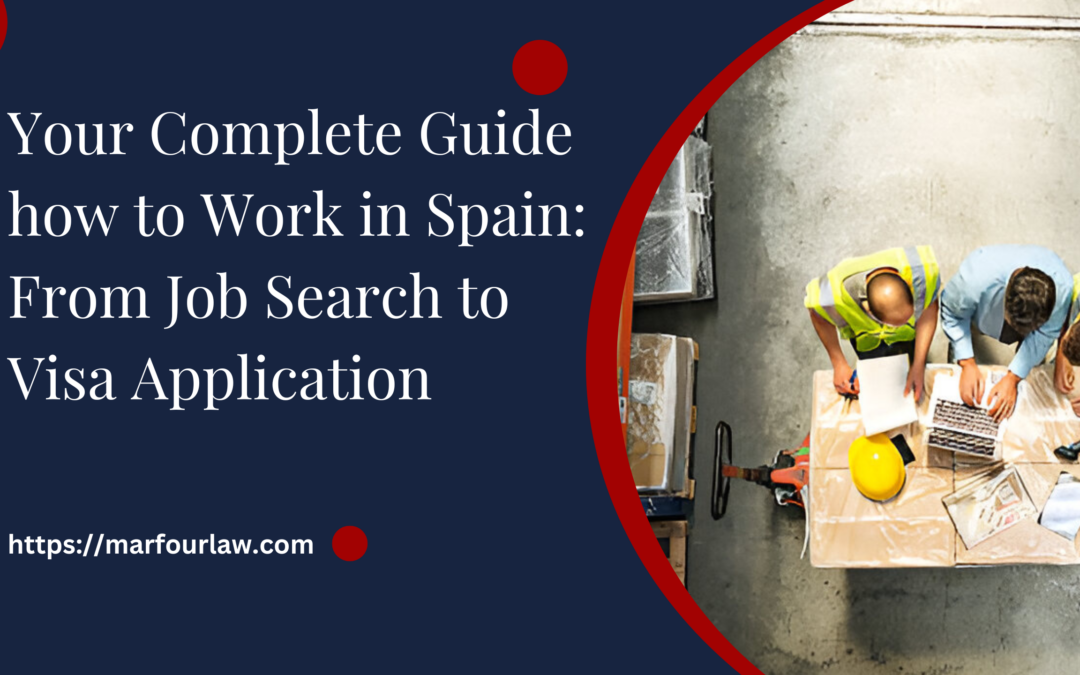How to Work in Spain: Spain, renowned for its vibrant culture, warm climate, and rich history, is a dream destination for many professionals seeking to advance their careers abroad. Whether you are considering a temporary position or a long-term role, knowing how to work in Spain involves several key steps. From finding job opportunities to understanding visa requirements, this guide provides a comprehensive overview of the essential steps to start your career in Spain successfully. This detailed guide will cover finding job vacancies, obtaining a work visa, and integrating into the Spanish job market effectively.
How to Work in Spain: A Guide
To work in Spain, you first need to find suitable job vacancies. The Spanish job market is diverse, and different sectors offer various opportunities. Here’s a detailed look at how to find job vacancies in Spain.
Utilizing Online Job Portals for Job Vacancies in Spain
Online job portals are one of the most efficient job search methods. These platforms list a wide range of opportunities across various industries. Here’s how to effectively use these portals:
InfoJobs:
InfoJobs is Spain’s largest job portal. It offers a comprehensive range of job listings across different sectors. To use InfoJobs effectively:
- Create a detailed profile that highlights your skills and experience.
- Upload an updated resume.
- Set up job alerts to receive notifications about relevant openings.
- Apply directly through the portal, and ensure that your application is tailored to each job listing.
Indeed:
Indeed aggregates job listings from various sources, including company websites and recruitment agencies. To maximize your job search:
- Use specific keywords related to your desired role and location.
- Filter search results by date to find the most recent listings.
- Set up job alerts to stay updated on new opportunities.
LinkedIn:
LinkedIn is a valuable tool for job seekers. It allows you to:
- Connect with industry professionals and potential employers.
- Join groups related to your field to stay informed about job openings.
- Follow companies you are interested in to receive updates on their job postings.
Xing:
Xing is a popular professional networking site in Europe. It offers:
- Opportunities to connect with professionals in your industry.
- Access to job listings across various sectors in Spain.
- The ability to participate in industry discussions and stay updated on trends.
When using these portals, ensure your profile is complete and professional. Highlight your skills, experiences, and achievements clearly to attract potential employers.
Networking to Find Job Vacancies in Spain
Networking is a crucial component of the job search process. Building relationships with professionals in your field can open doors to job opportunities not advertised publicly. Here’s how to network effectively in Spain:

Attend Industry Events:
Participate in conferences, seminars, and workshops related to your industry. These events are excellent for meeting potential employers and learning about job openings. To make the most of these events:
- Prepare an elevator pitch to introduce yourself.
- Bring business cards and exchange them with contacts.
- Follow up with connections you meet at the event.
Join Professional Associations:
Becoming a member of industry-specific associations can help you connect with professionals in your field. Associations often provide:
- Access to exclusive job listings.
- Opportunities for professional development and networking.
- Insights into industry trends and job market changes.
Leverage Social Media:
Use social media platforms like LinkedIn to connect with industry professionals and follow companies you are interested in. Engaging with content, participating in discussions, and joining relevant groups can increase your visibility and lead to job opportunities.
Informational Interviews:
Reach out to professionals in your field for informational interviews. These meetings can provide valuable insights into the job market and help you make connections that could lead to job opportunities.
Recruitment Agencies Specializing in Job Vacancies in Spain
Recruitment agencies are invaluable resources for job seekers, especially for expatriates looking to enter the Spanish job market. These agencies offer a range of services designed to streamline the job search process and increase the chances of finding suitable employment. By leveraging their extensive networks and industry knowledge, recruitment agencies can connect job seekers with opportunities that may not be available through traditional job search methods.
Randstad Spain
Randstad Spain is a global leader in HR services with a robust presence in Spain. They are well-regarded for their extensive job listings across various industries. As one of the largest recruitment agencies in Spain, Randstad provides several key services to job seekers:
- Job Listings Across Various Industries: Randstad offers a broad spectrum of job opportunities spanning numerous sectors, from healthcare and education to finance and technology. This diversity ensures that job seekers can find positions that match their qualifications and career aspirations.
- Support with CV Writing and Interview Preparation: Randstad provides personalized assistance with crafting a professional CV and preparing for interviews. Their expertise helps job seekers present themselves effectively to potential employers, increasing their chances of securing a job.
- Assistance with Work Permit Applications: For expatriates requiring work permits, Randstad offers guidance and support throughout the application process. This service is particularly beneficial for navigating the complexities of visa regulations and ensuring that all necessary documentation is in order.
Adecco Spain
Adecco Spain is another prominent HR solutions company that offers extensive job listings and specialized services. Known for its comprehensive approach to recruitment, Adecco provides several advantages to job seekers:
- Access to a Wide Range of Job Opportunities: Adecco’s extensive network includes job openings across various sectors, including temporary, permanent, and contract positions. This wide range of options allows job seekers to explore different career paths and find opportunities that align with their goals.
- Personalized Job Search Support: Adecco offers tailored support to job seekers, including career counseling and job search strategies. This personalized approach helps individuals navigate the job market effectively and identify positions that best fit their skills and experience.
Guidance on Adapting Your CV to the Spanish Job Market:
Adecco assists job seekers in customizing their CVs to meet the expectations of the Spanish job market. This includes advice on formatting, language, and highlighting relevant skills and experiences that appeal to local employers.
Manpower Spain
Manpower Spain is a well-established recruitment agency known for its comprehensive job placement services. With a strong reputation in the recruitment industry, Manpower provides several key services to enhance the job search process:
A Wide Range of Job Listings Across Different Sectors:
Manpower offers job opportunities in various fields, including administrative, industrial, and technical roles. This variety ensures that job seekers can find positions that match their professional background and career interests.
Assistance with Understanding Local Employment Practices:
Manpower provides valuable insights into Spanish employment practices, including labor laws, workplace culture, and contract types. This guidance helps expatriates adjust to the local job market and comply with relevant regulations.
Support with the Application Process:
Manpower assists job seekers throughout the application process, from submitting applications to preparing for interviews. Their support helps streamline the job search and increases the likelihood of securing employment.
By working with these recruitment agencies, job seekers can leverage their expertise and resources to access a range of job opportunities and receive personalized support. Whether you are looking for temporary or permanent positions, these agencies can help match your skills and career goals with suitable job openings in Spain.
Obtaining a Spain Work Visa
For non-EU/EEA or Swiss citizens, obtaining a work visa is crucial to working in Spain. Understanding the types of work visas available and the application process is essential.

Types of Spain Work Visas
Several types of work visas are available, depending on your qualifications and job type:
1. Highly Skilled Professional Visa: Designed for individuals with high qualifications or those filling positions in demand. To qualify:
- You must have a job offer for a role that requires specialized skills.
- You need to provide proof of your qualifications and experience.
2. EU Blue Card: A work and residence permit for highly skilled workers from non-EU countries. The benefits include:
- More effortless movement within the EU.
- Access to family reunification and long-term residency options.
- Higher job security and rights compared to other work visas.
3. Seasonal Work Visa: For temporary or seasonal employment, such as in agriculture or tourism. This visa typically requires:
- A job offer for seasonal work.
- Proof of the temporary nature of the job.
4. Self-Employment Visa: Individuals planning to start a business or work as freelancers. To obtain this visa:
- You must present a detailed business plan.
- You need to provide proof of financial stability to support your business.
How to Get a Work Visa in Spain
The process of obtaining a Spain work visa involves several steps:
Job Offer: Secure a job offer from a Spanish employer. This is often a prerequisite for applying for a work visa. Ensure the job offer is formal and includes details about your role and salary.
Employer Sponsorship: Your employer must apply for a work permit on your behalf. This involves:
- Applying to the Spanish Ministry of Labor.
- Providing documentation related to the job offer and your qualifications.
Visa Application: Once the work permit is approved, you can apply for a work visa at the Spanish consulate in your home country. The application process includes:
- Fill out the visa application form.
- Submitting required documents, such as your passport, job offer letter, and work permit.
Required Documents: Gather necessary documents, including:
- A valid passport with at least six months’ validity.
- A recent passport-sized photo.
- The Spanish Ministry of Labor approved the work permit.
- Proof of qualifications and work experience.
- A medical certificate stating that you are in good health.
- Proof of financial means to support yourself in Spain.
Application Submission: Submit your visa application, the required documents, and applicable fees. The consulate may require an interview or additional information.
Visa Approval: Wait for the consulate to process your application. Depending on the visa type and individual circumstances, this can take several weeks to months.
Understanding the Spain Work Visa Application Process
The work visa application process can be detailed and time-consuming. Here are some key points to keep in mind:
- Timeline: The entire process can take from a few weeks to several months. Start the application process well in advance of your intended start date.
- Interviews: You may be required to attend an interview at the consulate. Prepare for questions about your job, qualifications, and reasons for moving to Spain.
- Health Insurance: You should provide proof of health insurance coverage. Ensure that your insurance meets the requirements set by the Spanish authorities.
Guiding the Spanish Job Market
After securing a job and obtaining a work visa, adapting to the Spanish job market is crucial for success. Understanding and integrating local practices will help you thrive in your new role.

Work Culture in Spain
Understanding the work culture in Spain can enhance your work experience and help you integrate better into your new environment:
- Work Hours: The typical workday in Spain is from 9 am to 6 pm, with a more extended lunch break, especially in smaller towns. Some businesses may observe a siesta, where they close for a few hours in the afternoon.
- Business Etiquette: Politeness and formality are essential in Spanish business culture. Addressing colleagues with their titles and using formal language in professional settings is standard.
- Dress Code: Business attire tends to be formal, particularly in corporate settings. In more casual environments, smart-casual dress is often acceptable.
- Communication Style: The Spanish communication style can be direct, but it is also essential to be respectful and professional. Building solid relationships with colleagues and supervisors is valued.
Employment Contracts in Spain
Familiarize yourself with the different types of employment contracts available in Spain:
- Indefinite Contracts: These are permanent contracts with no set end date. They offer job security and benefits such as paid leave and social security contributions.
- Temporary Contracts: These contracts are for a specific period or project. They may be used for seasonal work or short-term projects.
- Part-time contracts involve working fewer hours than the standard full-time workweek. They are often used for roles that require less than full-time commitment.
- Freelance Contracts: These contracts are for self-employed individuals providing services to clients. Freelancers are responsible for managing their own taxes and social security contributions.
Workers’ Rights and Benefits in Spain
As an employee in Spain, you have certain rights and benefits that are important to know:
- Social Security: Employees contribute to the Social Security system, which provides coverage for healthcare, unemployment benefits, and pensions. Contributions are shared between the employer and employee.
- Paid Leave: Employees are entitled to paid vacation days, typically 30 days per year. In addition, employees receive paid leave for public holidays and sick leave.
- Maternity and Paternity Leave: New parents are entitled to paid maternity and paternity leave. Maternity leave is typically 16 weeks, while paternity leave is usually 12 days, with potential extensions depending on individual circumstances.
- Workplace Safety: Employers are required to provide a safe working environment and comply with health and safety regulations. Employees have the right to report unsafe conditions without fear of retaliation.
FAQs
What are the main job sectors in Spain?
Spain has a diverse job market with key sectors including:
- Tourism: A significant part of the economy, offering opportunities in hospitality, travel, and entertainment.
- Healthcare: With a growing demand for medical professionals and support staff.
- Education: Opportunities for teachers, educators, and administrative staff in schools and universities.
- Information Technology: Growing demand for IT professionals, software developers, and tech support.
- Agriculture: Seasonal and permanent positions in farming and related industries.
Can I work in Spain without speaking Spanish?
While Spanish is the official language, it is possible to find work in Spain without speaking it, especially in multinational companies or roles where English is the primary language. However, learning Spanish can significantly improve your job prospects and help you integrate into the workplace and local community.
How long does it take to get a work visa in Spain?
The processing time for a Spanish work visa can vary depending on the type of visa and individual circumstances. On average, it can take from a few weeks to several months. Starting the application process as early as possible is advisable to account for any potential delays.
Do I need a job offer before applying for a work visa in Spain?
Yes, a job offer from a Spanish employer is typically required before applying for a work visa. The job offer is a critical component of the visa application process, as it demonstrates that you have secured employment and are sponsored by a Spanish company.
Conclusion
Working in Spain provides a unique opportunity to experience a new culture and advance your career in a dynamic and vibrant environment. Following the steps outlined in this guide, you can effectively find job vacancies, obtain a work visa, and integrate into the Spanish job market. You can make the most of your professional journey in Spain with proper planning and preparation. Embrace the opportunity to work in a country known for its rich cultural heritage and exciting career prospects.

